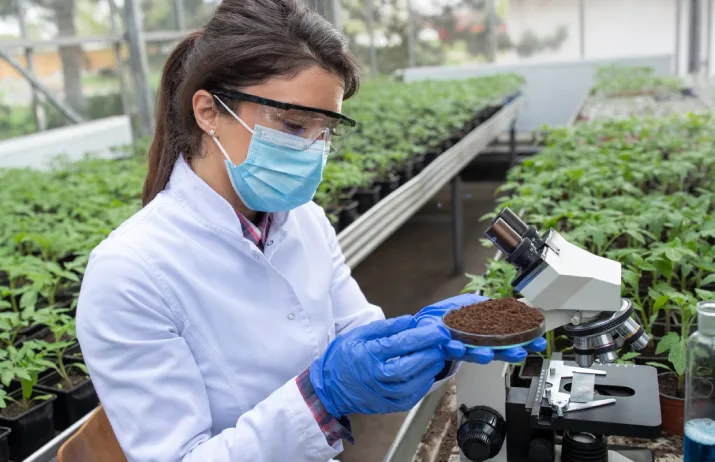5 diverse careers in agriculture
From veggie farms to vineyards, cities to country towns, brokering and trading to research and development, we cover the surprising variety of agricultural careers out there.
Are agricultural careers mainly in rural places?
When the term ‘agriculture’ is mentioned, most people think of hard, physical labour, perhaps on wheat fields or cattle stations far from phone reception. Which is partly true, but unfair on the many marketing, sales, logistics, science and finance folk that make up the urban- or regional-based workforce in the sector.
And since agriculture amounts to 11.6% of Australia’s goods and services exports, it supports a significant number of livelihoods, from small family-owned farms to large-scale operations.
Want to know more about the cornucopia of careers in agriculture? Read on!

The grain trader
Grain traders connect grain producers and processors with buyers, locally and internationally. Common grains we grow include wheat, canola, sorghum, barley and oats. Australia accounts for 13.7% of the world’s wheat exports and our major customers are Indonesia, China, Vietnam and the Philippines.
As a grain trader, your job will be to understand the grain market (factors impacting supply and demand), futures and foreign exchange, so that you can buy and sell grain at prices that are attractive to both parties, while earning a commission for your company, and therefore, yourself.
In this role, you’ll also need to have an interest or experience in international trade, shipping, commodities and finance.
Grain trading falls under the umbrella of agribusiness, the sub-sector of agriculture that conducts activities to maximise profit while satisfying consumer needs.
What’s a grain trader’s average salary?
According to job listings on SEEK, grain trader positions pay between $90,000 and $125,000 yearly and are mainly office-based.
How do I become a grain trader?
If you’re curious about the intersection of agriculture and business, study an undergraduate certificate, associate degree, graduate certificate or masters degree in agribusiness.
The farm operations manager
Farm operations managers are responsible for directing the day-to-day activities on a farm, whether crop-, livestock- or aquaculture-based.
As one, you’ll create long-term plans for the farm, ensure buildings and equipment are maintained, control costs, keep production moving smoothly and organise marketing and sales.
If the farm you work for is in a rural area, you’ll often be offered on-site accommodation and board, fully paid for.
There are also farms closer to and within metropolitan areas, as a progressive interest in urban farming grows.
For example, FareShare, a charity that cooks free, ready meals for distribution to food banks and homeless shelters, maintains three kitchen gardens in Melbourne so that they have access to a reliable supply of fresh vegetables.
What’s a farm operations manager’s average salary?
Australian farm operations managers earn between $75,000–$124,415 per year, depending on experience.
How do I become a farm operations manager?
While tertiary study isn’t necessarily required for this position, a qualification will help you to learn about the most up-to-date principles and practices in agriculture. You’ll also explore current issues faced by farmers, such as how to build resilience in the face of climate change.
Consider a degree in agricultural science or agricultural technology and management, such as those offered through Open Universities Australia. You may even get the chance to complete an internship for valuable work experience.

The soil health specialist
Without healthy topsoil, nothing will grow. Here’s a worrying fact—an estimated 4.4 billion metric tonnes of soil has eroded since European settlement in Australia. And 40% of Australia’s land is facing medium erosion while another 11% is facing high levels of erosion.
As a specialist in soil health, you’ll be responsible for understanding the environment and factors impacting soil health, then creating plans and advising farmers on how to restore soil.
For example, tilling erodes soil, releases carbon dioxide into the atmosphere and kills important soil microbes that have symbiotic relationships with plants (yet, the majority of farms still practise tilling for ease of killing weeds). In regenerative agriculture, a soil health specialist may recommend a no-till approach in combination with alternative weed-killing methods.
Or in addressing erosion on a cattle station, the recommendation may be to allow native grasses to grow back—the roots of which hold soil together and prevent erosion—by removing livestock from a damaged paddock for a number of years.
What’s a soil health specialist’s average salary?
Soil health specialists and scientists earn around $113,256 per year. With experience, at director-level, you could earn upwards of $200,000 per year.
How do I become a soil health specialist?
You’ll need a solid grounding in science plus knowledge of the latest agriculture principles and practices. If you’re thinking of studying online, consider a course like this Bachelor of Agricultural Science or this Bachelor of Science (Regenerative Agriculture).
The sustainable agriculture researcher
Sustainable agriculture research aims to find innovative, low-waste and viable solutions for growing food, land use and food security that work in harmony with natural ecosystems.
If you’re interested in eating more sustainably, protecting the planet’s biodiversity and promoting food sovereignty, this could be the career for you.
Researchers in this space work across disciplines, mixing biology, economics, engineering, chemistry, community development and more.
A project could include investigating and adapting traditional growing methods for future use. Unsurprisingly, many ‘forgotten’ ways are far more sustainable than the post-industrial revolution practices that dominate current agriculture.
On the opposite end of the spectrum, you could be researching how AI might contribute to integrated pest management. The opportunities for exploration are endless.
What’s a sustainable agricultural researcher’s average salary?
The median salary for this role is $106,500 per year. However, with experience and further study like a PhD, you could earn much more. According to CSIRO job ads for a senior research scientists, you could earn up to $142,321 a year plus benefits.
How do I become a sustainable agricultural researcher?
Study the holistic management of soils, fertilizers and water. Understand how farming practices impact the climate and environment, and vice versa. Learn about First Nations peoples’ worldviews and approach to resources—for example, ‘take only what you need, leave the rest behind’, so that an existing ecosystem can continue thriving.
Many of these topics are examined in regenerative agriculture courses. Southern Cross University offers these at a diploma, bachelor degree and graduate certificate-level through Open Universities Australia.
The agronomist
Agronomists are experts on the quality, production and management of crops and livestock—assessing their growing conditions, their environment, and their health.
You may have heard of the term ‘precision agriculture’, a farming management strategy that uses tech (like sensors and drones) to observe, measure and adjust farming operations based on factors like moisture, nitrogen, organic matter, pH and mineral levels in soil. This is an example of an approach an agronomist might take in advising their farmer-clients.
With expertise in agronomy, an agronomist can also work in adjacent roles, such as in research, for a winemaker, or even in sales or supplier management for food production companies.
What’s an agronomist’s average salary?
On average, agronomists earn between $75,000–$95,000 per year, with senior agronomists taking home around $115,000 per year.
How do I become an agronomist?
Key competencies for agronomists include knowledge of agricultural-food chain processes, understanding agricultural law, agricultural science, and lab skills. The minimum qualification you’ll need to join the field is a diploma or associate degree-level qualification in agriculture, while a bachelor degree in agricultural science or agriculture and technology is highly recommended.
Apart from full courses in agriculture, Open Universities Australia also offers short courses and single subjects in agriculture—tasters to help you decide whether to go for the full qualification!



